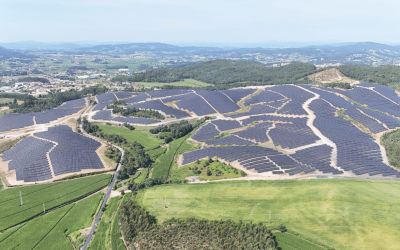BNZ, an independent power producer (IPP) that develops, builds and operates solar photovoltaic projects, has broken ground this Tuesday on the construction of a solar photovoltaic power plant in the municipality of Alcalá de los Gazules, in the province of Cádiz (Andalusia, Spain), with a total capacity of 74MW. The groundbreaking ceremony was attended by representatives of BNZ, Glennmont Partners of Nuveen, the Spanish multidisciplinary engineering company Grupotec, the Delegation of the Andalusian Regional Government in the province of Cadiz and the City Council of Alcalá de los Gazules.
This will be BNZ’s first plant to be built in Spain, where it expects to install approximately 600 MWp capacity by 2026. In total, BNZ plans to deploy an aggregate portfolio of more than 1.7 GW of solar PV in southern Europe by the end of 2026.
The Managing Director of BNZ, Luis Selva, highlighted that “we are proud to promote a project of these characteristics in this wonderful land, which represents a further step in the energy transition in Spain, in Andalusia and in Cadiz, as well as a clear commitment by our company to 100% clean and renewable energy generation, and to the decarbonisation of our economy. These elements are fully inscribed in the DNA of BNZ, which is dedicated exclusively to promoting generation projects based on solar energy“.
The Head of Asset Management at Glennmont Partners of Nuveen, parent company of BNZ, Jordi Francesch, pointed out that “the energy transition offers great opportunities for our country, both in terms of the generation of renewable energy sources and the creation of wealth and jobs associated with it. Moreover, the current context of climate emergency and geopolitical instability only serve to highlight this opportunity even more“.
Vicente Giménez, Construction Director of Grupotec, the company in charge of the construction of the plant, pointed out that “photovoltaic is the most competitive clean energy, which in turn boosts the economy of the area with a high participation of companies in the construction phase and later in the maintenance phase“.
Mercedes Colombo, Delegate of the Andalusian Regional Government in Cádiz, stated that “renewable energies are a priority for Andalusia and for Juanma Moreno’s government, because we want it to be the leading region in Spain in the generation of clean energy and thus cover 75% of the needs of Andalusians by generating energy that is close to home and sustainable“.
Javier Pizarro, Mayor of Alcalá de los Gazules, added: “This is a great employment opportunity for the town and the surrounding municipalities, which helps people to stay in Alcalá de los Gazules”.
The electricity production of this project would be capable of supplying the annual electricity needs of almost 25% of the city of Cadiz. The clean energy produced at this plant will avoid the emission of 39,031 tonnes of CO2 equivalent per year, which represents some 64,800 round-trip flights between Seville and Rome. In addition, BNZ estimates that it will create between 560 and 580 direct and indirect jobs by 2024, when the plant is inaugurated.
The production of reliable and affordable solar photovoltaic energy domestically will avoid the import of fossil fuels such as natural gas in third countries. This will enhance energy independence and security of supply, as well as improve environmental sustainability. For example, the energy produced by this BNZ project will save the use of almost 30 million m3 per year of natural gas that would have been consumed by combined cycle gas turbine (CCGT) plants to generate the same amount of energy.
BNZ will work with local authorities on environmental projects
BNZ is committed to the environmental and social progress of the local communities where the company operates its plants. Therefore, in addition to the positive economic impact of the facilities on the local community and their compliance with the highest environmental standards, BNZ will collaborate with local authorities on environmental projects.
As part of this commitment, BNZ will plant hedgerows around the plant with native species such as mastic, wild olive, holm oak and palmetto. Livestock routes will also be conserved and improved; a crossing point on the adjacent river bank will be restored with native species such as tamarisk and oleander, as well as preserving bird species such as the Iberian imperial eagle and necrophagous birds. Finally, water fountains, shelters, roosts and nesting boxes for birds, bats and insects will be installed.


